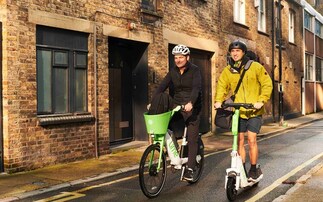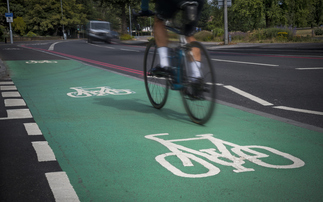The Danish chemicals expert thinks its enzymes could help break down barriers to sustainable biofuels
The fast-rising uptake of electric cars around the world means there could be 125 million on the road by 2030, up from just three million in 2017.
But despite the growing success story of electric cars, the fact remains that the share of renewable energy in transport sat at only 2.8 per cent globally in 2015. Even under progressive projections, just one third of the world's cars will be electric or hybrid by 2040. Meanwhile, other transport sectors such as heavy duty vehicles, aviation and shipping are proving more challenging to electrify.
Decarbonising this large remaining wedge of transport is one of the major areas where Danish company Novozymes sees its biotechnology products contributing towards a low carbon future.
"There is no solution that will solve all the problems we have in order to decarbonise the transportation sector," says Thomas Schrøder, vice president of biorefining commercial at Novozymes. Many different technologies, including electric, biogas and hydrogen, will need to expand, "so that we actually have a remote chance of hitting the Paris 2C scenario", he says.
According to a 2018 Novozymes report, even if all but the most niche segments in transport are electrified, there will still be demand for green hydrocarbon feedstocks for chemicals and materials.
As BusinessGreen pointed out in its long read investigation earlier this month, delivering SDG7 by 2030 not only means vastly increasing the amount of renewable power sources pretty much everywhere, but also cleaning up the energy used in transport, where progress on limiting emissions has remained frustratingly stagnant.
Novozymes made sustainability its "company purpose" back in 2015. "We defined it as finding biological answers, so solutions in biology, to create better lives in a growing world," says Claus Stig Pedersen, head of corporate sustainability at the company. "In essence, that is to find better solutions, sustainable solutions, that help people in a world under growing pressure."
It's committed to finding some answers to the transport conundrum, by developing biological solutions to support the development of clean biofuels. The firm does this by identifying enzymes which help to break down a variety of non-fossil feedstocks.
Its largest business in this area currently is the sale of enzymes that help to extract sugars from corn which then are fermented into ethanol - known as first generation biofuels. It also produces foam reduction enzymes used in the fermentors of sugarcane ethanol production facilities.
But Novozymes also has a growing business in turning agricultural waste, such as wheat straw and corn stover, as well as municipal solid waste, into bioenergy. Known as second generation biofuels - technically "cellulosic ethanol" - the process works by breaking down lignocellulose biomass in these waste materials or energy crops into a pulp, which is then fermented into ethanol. The process is less efficient than traditional corn-based ethanol production, since it requires more processing, and thus more expensive. This is where Novozymes' enzymes come in.
It spent years identifying and collecting well-balanced 'cocktail' of enzymes with the potency to break down these plants materials. These enzymes come from all sorts of places in nature, says Schrøder: forests, mountains, lakes; plants and mushrooms. The resulting product, initially released in 2010 and known as Cellic, consists of hundreds of different enzyme activities.
"We've been working on it since 2001, so it's been a long journey," says Schrøder. "We could do it for a long time, but now we can do it economically. So we are taking a lot of cost out and efficiency up of converting the cellulose material to sugars."
Chemical manufacturing firm M&G, a partner of Novozymes, opened the first commercial-scale cellulosic ethanol plant back in 2012, although this was shut down in 2017 due to financial restructuring of its parent company. As well as a host of demonstration projects, there are currently seven operating commercial scale plants globally following around $2bn of investment. Novozymes' enzyme is used in five of these, including Raizen and GranBio in Brazil and Poet in the US. Novozymes expects a wave of new plants to be announced in the next six to 12 months in places such as China, India, Brazil and Europe, Schrøder tells BusinessGreen.
Around half of global bioenergy use is currently from traditional, largely unsustainable, biomass, according to the International Energy Agency (IEA). But the so-called second-generation market is tipped to grow, fast.
In its 2017 bioenergy roadmap, the IEA assumes around 145 EJ per year of sustainable bio-feedstock will be available by 2060 - almost triple the current levels - of which around 40 per cent should come from agricultural wastes and residues. Cellulosic ethanol and biodiesel use should rise from almost nothing today to 15,000 peta joules (PJ) by 2050 it says in its two-degree scenario projection. This is far above the 2,600 PJ it says should come from ethanol from sugar and starch crops.
Second-generation biofuels have been slow to arrive due to their higher costs, but research has shown they can offer significant carbon reductions compared to first-generation biofuels. As FAO chief Jose Graziano da Silva argued in 2015, given the right conditions, biofuels can be an effective means to increase food security by providing poor farmers with a sustainable and affordable energy source. Novozymes' enzymes could prove a vital piece of the toolkit needed to help make sure these 'right conditions' are met.







